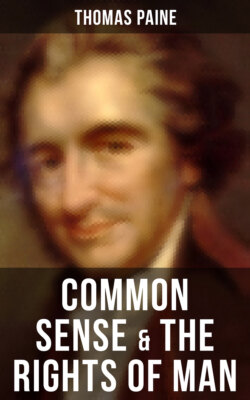Читать книгу Common Sense & The Rights of Man - Thomas Paine - Страница 11
На сайте Литреса книга снята с продажи.
The Author's Preface to the French Edition
ОглавлениеTable of Contents
The astonishment which the French Revolution has caused throughout Europe should be considered from two different points of view: first as it affects foreign peoples, secondly as it affects their governments.
The cause of the French people is that of all Europe, or rather of the whole world; but the governments of all those countries are by no means favorable to it. It is important that we should never lose sight of this distinction. We must not confuse the peoples with their governments; especially not the English people with its government.
The government of England is no friend of the revolution of France. Of this we have sufficient proofs in the thanks given by that weak and witless person, the Elector of Hanover, sometimes called the King of England, to Mr. Burke for the insults heaped on it in his book, and in the malevolent comments of the English Minister, Pitt, in his speeches in Parliament.
In spite of the professions of sincerest friendship found in the official correspondence of the English government with that of France, its conduct gives the lie to all its declarations, and shows us clearly that it is not a court to be trusted, but an insane court, plunging in all the quarrels and intrigues of Europe, in quest of a war to satisfy its folly and countenance its extravagance.
The English nation, on the contrary, is very favorably disposed towards the French Revolution, and to the progress of liberty in the whole world; and this feeling will become more general in England as the intrigues and artifices of its government are better known, and the principles of the revolution better understood. The French should know that most English newspapers are directly in the pay of government, or, if indirectly connected with it, always under its orders; and that those papers constantly distort and attack the revolution in France in order to deceive the nation. But, as it is impossible long to prevent the prevalence of truth, the daily falsehoods of those papers no longer have the desired effect.
To be convinced that the voice of truth has been stifled in England, the world needs only to be told that the government regards and prosecutes as a libel that which it should protect.1 This outrage on morality is called law, and judges are found wicked enough to inflict penalties on truth.
The English government presents, just now, a curious phenomenon. Seeing that the French and English nations are getting rid of the prejudices and false notions formerly entertained against each other, and which have cost them so much money, that government seems to be placarding its need of a foe; for unless it finds one somewhere, no pretext exists for the enormous revenue and taxation now deemed necessary.
Therefore it seeks in Russia the enemy it has lost in France, and appears to say to the universe, or to say to itself. "If nobody will be so kind as to become my foe, I shall need no more fleets nor armies, and shall be forced to reduce my taxes. The American war enabled me to double the taxes; the Dutch business to add more; the Nootka humbug gave me a pretext for raising three millions sterling more; but unless I can make an enemy of Russia the harvest from wars will end. I was the first to incite Turk against Russian, and now I hope to reap a fresh crop of taxes."
If the miseries of war, and the flood of evils it spreads over a country, did not check all inclination to mirth, and turn laughter into grief, the frantic conduct of the government of England would only excite ridicule. But it is impossible to banish from one's mind the images of suffering which the contemplation of such vicious policy presents. To reason with governments, as they have existed for ages, is to argue with brutes. It is only from the nations themselves that reforms can be expected. There ought not now to exist any doubt that the peoples of France, England, and America, enlightened and enlightening each other, shall henceforth be able, not merely to give the world an example of good government, but by their united influence enforce its practice.
(Translated from the French)
1. The main and uniform maxim of the judges is, the greater the truth the greater the libel.
